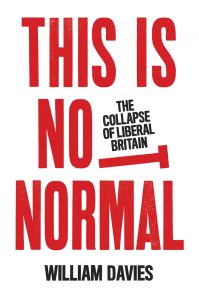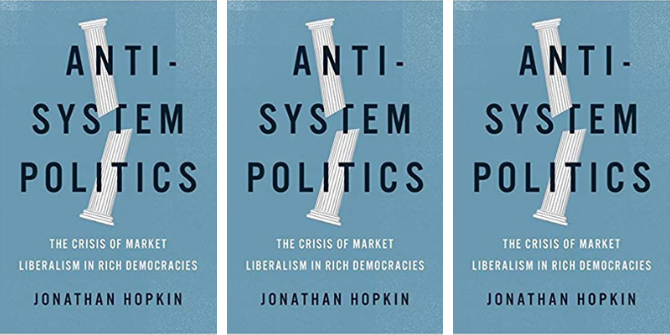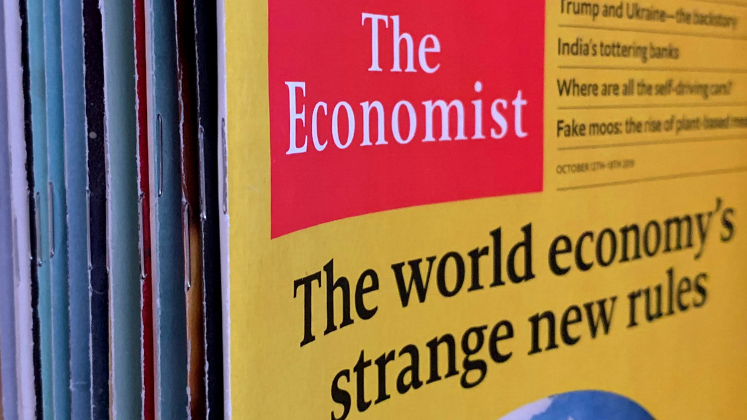In This Is Not Normal: The Collapse of Liberal Britain, William Davies pores over the deeper roots, expressions and manifestations of four interlocking recent crises in British politics, addressing some of the most pressing and perplexing questions facing the UK. The book is exceptionally successful in offering a sustained exploration of the deeper roots of these disjunctures, writes Sean Kippin, and ends with a surprisingly optimistic and uplifting message, given the scale of the challenges.
This Is Not Normal: The Collapse of Liberal Britain. William Davies. Verso. 2020.
 There is a particular brand of UK media figure. Usually male, they revel in the gossip, intrigue and parlour games of British politics. Policy seems to bore them. Economic policy is interesting only insofar as it affects the reputation of current UK Chancellor Rishi Sunak. One such journalist is Matt Chorley of the Times. His catchphrase following the UK’s first attempted departure from the European Union was ‘This Is Not Normal’. Fortunately, this narrow perspective is not that of Professor William Davies, whose book shares the same name. While Chorley marvels at the weirdness of it all, Davies’s This Is Not Normal: The Collapse of Liberal Britain seeks to pore over the deeper roots, expressions and manifestations of four interlocking crises in British politics, addressing some of the most pressing and perplexing questions facing the UK.
There is a particular brand of UK media figure. Usually male, they revel in the gossip, intrigue and parlour games of British politics. Policy seems to bore them. Economic policy is interesting only insofar as it affects the reputation of current UK Chancellor Rishi Sunak. One such journalist is Matt Chorley of the Times. His catchphrase following the UK’s first attempted departure from the European Union was ‘This Is Not Normal’. Fortunately, this narrow perspective is not that of Professor William Davies, whose book shares the same name. While Chorley marvels at the weirdness of it all, Davies’s This Is Not Normal: The Collapse of Liberal Britain seeks to pore over the deeper roots, expressions and manifestations of four interlocking crises in British politics, addressing some of the most pressing and perplexing questions facing the UK.
Over the past four years, Britain has swung from one crisis to another, which This is Not Normal examines. The book is structured around three essays, each written at the time and responding to the focusing events of these broader crises. ‘Phase one’ – covering the June 2016 ‘Brexit’ referendum to the 2017 ‘almost Corbyn’ UK General Election – saw an anti-liberal backlash which influenced and almost engulfed the governing Conservative Party, for most of this period led by Theresa May.
The second phase ran until 2019, during which May was forced by circumstance to request from the EU a delay to Brexit. During this period, a weak government (and an unlikely custodian of governmental norms) faced continual defeats and lost ground to its increasingly belligerent right flank. This reached its high point in April 2019 with the European Parliament elections, when the new Brexit Party stunningly swept all before it. This marked the beginning of ‘Phase three’, which ends with the UK’s eventual departure from the EU in January 2020 (which followed the Conservatives’ – and Boris Johnson’s – resounding victory in the December 2019 General Election). These central chapters are book-ended by thoughtful introductory and concluding chapters written after the events, pulling this clear-eyed narrative together.

Image Credit: Crop of ‘Union Jack on the Ground’ by Ivan Bandura licensed under CC BY 2.0
Cumulatively, the series of events which took place during these three phases marked the abandonment of Britain’s pretence of being a ‘normal’ democratic country. Norms of all kinds were abandoned. Brexit saw elites reject the notion that government’s role is to provide stability and prosperity to its citizenry. A core assumption of liberal constitutionalism – that a portion of public life exists which sits beyond the grasp of politics – has been firstly called into question and then disproven. A series of outlandish lies proved decisive in the EU referendum. Supreme Court justices have appeared on the front of the Daily Mail as ‘Enemies of the People’. The Conservative Party has mutated from a fusty and somewhat heartless custodian of elite interest into a rabble-rousing populist outfit that expels, at a stroke, 21 of its MPs. The Conservatives’ shift is partly what is at issue here, with May attempting to become the standard bearer of this new, Brexitised and populist Conservatism, but eventually falling short owing to her own continuing belief in governing norms (as evidenced by her espousal of an essentially sensible EU Withdrawal Agreement).
Lobby journalists have documented these events effectively. What Davies’s book does exceptionally well is to fix these narratives to an ongoing exploration of the deeper roots of these disjunctures. One that is particularly worthy of discussion is the rise of neoliberalism, which permeated and then saturated Conservatism throughout the second half of the twentieth century, before becoming the dominant ideology of the political mainstream. While initially seen as a set of assumptions which could exist happily with liberal constitutionalist mores, it has proven disastrous in the longer term, inserting the logic of the market into every facet of our lives, monetising and commodifying spaces which had always seemed if not sacred, then at least beyond the reach of the money men. This gradually erodes and hollows out institutions, which begin to exist simply as a veneer for the crude logic of accumulation which governs public life. The result is public cynicism and discontent, which is skillfully exploited by nationalists, who rearticulate their old-fashioned creed as an – or indeed the only – apposite response to this malaise. There is a crude irony that many of the figures peddling this reheated chauvinism have themselves advocated and profited from the harshest neoliberal reforms.
The COVID-19 pandemic has different origins, but it is nonetheless subject to and shaped by the longer-term structural changes described in this book. The UK Government response can be roughly divided into two streams: the policy response and the communications response. Following a decade of austerity and a further round of marketising neoliberal reforms under the Conservatives, the institutional set-up has left the government struggling to control a system of its own design. This, in turn, has created a system which responds to market rather than public health logic, and can be evidenced by the extraordinary overspend on public contracts and consultants. The communications response, meanwhile, has seen a preference for short-term (and occasionally post-truth) rhetorical and tactical victories predominate at the expense of the sober, factual and clear provision of information required in a crisis of this nature.
Davies ends by proposing that a coalition of legal and economic rebuilders ‘manufacture’ a new social and legal system which embraces the stability of the old liberalism with a kind of practical utopianism which measures up to the socioeconomic and environmental challenges that our societies face. This takes inspiration from those early builders of neoliberalism, who quietly and methodically built the infrastructure for a new world with a combination of ideological intensity and practicality. Davies wants to repeat this process in reverse, creating a political, economic and legal structure which sits on the fringes of orthodox capitalism. It is a surprisingly optimistic and uplifting message, given the scale of the challenge. The pandemic – stretched out indefinitely before us – may provide further opportunities for a reappraisal. However, as Davies so skillfully shows, it would be foolish to make any firm predictions of what happens next.
Note: This review gives the views of the author, and not the position of the LSE Review of Books blog, or of the London School of Economics.







